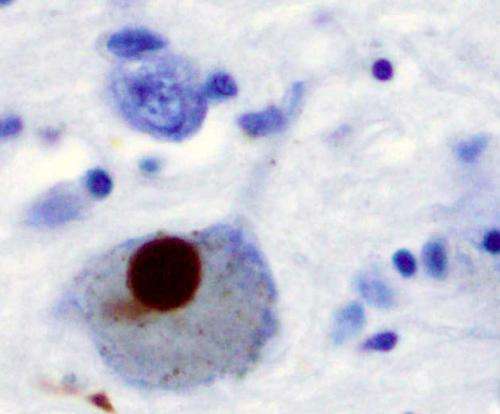Plasma Ap0A1 associates with age at onset and motor severity in early Parkinson's disease

Building on previous research showing that plasma Apolipoprotein A1 (ApoA1) may be a useful biomarker for Parkinson's disease, researchers from the Perelman School of Medicine at the University of Pennsylvania have replicated these findings in approximately 1,000 patients from across the world, upholding their initial findings from a screen of many candidate proteins. Their work will be presented at the American Academy of Neurology annual meeting in Washington, D.C. on Thursday, April 23.
First author Christine Swanson, PhD, a post-doctoral researcher in Neurology and a team led by senior author Alice Chen-Plotkin, MD, an assistant professor of Neurology at Penn were also the first to use plasma samples from the Michael J. Fox Foundation's flagship biomarker program, the Parkinson's Progression Marker Initiative (PPMI).
In the PPMI cohort, the team measured Plasma ApoA1 and HDL, as ApoA1 is a large component of the HDL cholesterol fraction, at baseline, six months, and 12 months after diagnosis in 154 patients with PD and 100 normal controls. They found that lower baseline plasma ApoA1 levels were associated with an earlier age at PD onset in early-stage patients who were not yet taking medications for PD. Moreover, they showed that lower baseline ApoA1 levels trend towards association with worse motor severity.
"Our results confirm the association of lower plasma ApoA1 levels with indicators of poorer integrity of the dopamine system in early-stage PD patients not yet on medication," Swanson said. The dopaminergic system encompasses the complex group of nerve cells that facilitate movement, thinking and reward. A lack of dopamine causes the system to malfunction leads to the short, rigid movements that are the hallmark of PD.
Swanson, Chen-Plotkin and colleagues then performed a meta-analysis of five PD cohorts, including the PPMI cohort, encompassing more than 1,000 patients, which confirmed significant association of lower plasma APoA1 with earlier age at PD onset and greater motor severity.
"We are thrilled at these results," Chen-Plotkin said. "In the biomarker field, many candidates may initially appear promising, but it has been very difficult to replicate these promising leads until now." The findings suggest the development of robust plasma-based biomarkers in PD could lead to new approaches for identifying those at risk for PD and developing novel therapies."
Additional data used in the preparation of this article were obtained from the Parkinson's Progression Markers Initiative (PPMI) database (www.ppmi-info.org/data).

















